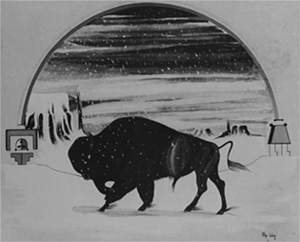Pop Wea facts for kids
Quick facts for kids
Pop Wea
|
|
|---|---|
| Died | 1966 |
| Nationality | Taos Pueblo |
| Known for | Pottery and painting |
Pop Wea, also known by names like Lori Tanner, was a talented Native American artist. She lived until 1966. Pop Wea was from the Taos Pueblo, a Native American community in New Mexico. She was known for both her paintings and her pottery. Her art is featured in important books about Native American painters.
Pop Wea's Art and Style
Pop Wea created many interesting artworks. One of her paintings, Taos Warrior Dance, is displayed at the Arizona State Museum. This museum is part of the University of Arizona.
Her art was often described as exciting and different from traditional styles. For example, her painting Buffalo in snow shows a dramatic scene. Sometimes, her paintings looked like they had a "three-dimensional" effect. This means they seemed to have depth, almost like sculptures.
In 1965, Pop Wea won first prize for her painting Eagle Dance. This award was given at the Scottsdale Indian Art Exhibition. People said her painting had "startling calligraphy" on a dark background. This means the lines and shapes in her painting were very striking.
Art Exhibitions
Pop Wea's artwork was shown in several important places. In 1962, her art was part of an exhibition at the Museum of Northern Arizona. Later, in 1967, her work was displayed at the Heard Museum.
Pop Wea was seen as a very promising artist. Sadly, she passed away at a young age. Her reputation as an artist grew a lot after a special exhibition in Gallup, New Mexico, in 1963. She died unexpectedly just three years later.
Where to Find Her Art
Many of Pop Wea's artworks are part of the James T. Bialac Collection. This collection focuses on paintings from the Southwest United States. It is kept at the Arizona State Museum. Her art is also owned by many private collectors.
Family Connections
Pop Wea had a famous family member who was also an artist. She was the niece of Pop Chalee, another well-known artist from the Taos Pueblo.


